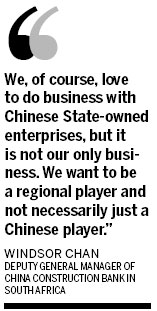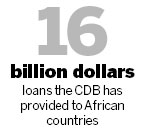China ups investment in Africa's bank sector
Updated: 2013-03-26 08:05
By Andrew Moody and Zhao Yanrong in Johannesburg (China Daily)
|
||||||||

More locals putting their faith in safe havens: industry veteran
Banking is one of the sectors of the African economy in which China is emerging as a significant player.
The Industrial and Commercial Bank of China concluded the largest foreign direct investment deal in South African history six years ago when ICBC paid $5.5 billion for a 20 percent stake in Standard Bank, Africa's largest bank.
Bank of China, which has had a presence on the continent since 1997, and China Construction Bank, which arrived in 2000, are also expanding operations.
The Chinese government policy banks - The Export-Import Bank of China (China Exim Bank) and China Development Bank - have also bankrolled some of the major infrastructure projects on the continent over the past decade.
The CDB revealed earlier this month it has provided $16 billion loans to African governments and $700 million loans to African small- and medium-sized enterprises.
Liu Yagan, who was one of the architects of the ICBC deal and is now chief representative of ICBC Africa, based in Cape Town, where the bank opened an office of its own in 2011, said the Standard Bank investment has proved a success.
"The first year we worked together, we introduced 700 Chinese corporations operating in Africa to Standard Bank who opened accounts. You can't imagine that would have happened without our investment," he said.
Liu, who was speaking at the Radisson Blu Hotel in Sandton in Johannesburg, said buying a stake was its preferred way of entering Africa.
"We needed to find the best way to enter the continent. Africa is very big with 53 countries, many of them with a different culture. We needed to find a good target with a very strong presence not just in one country, but in many countries," he said.

International management consultant firm Roland Berger said the banking sector in sub-Saharan Africa, in particular, represents a huge growth opportunity.
It estimates that with four out of five adults on the continent having no access to banking services, there are $60 billion a year in deposits up for grabs from low earners alone.
With the banking markets in the United States and Europe being subdued, Africa is now one of the more attractive banking markets in the world.
Chinese banks are now competing head-on against long-established players on the continent such as the UK's Barclays, whose Africa banking operations are now part of the Absa Group, in which it has a controlling interest; the Portuguese BPI bank; Societe Generale of France; the Spanish Banco Espirito Santo; as well as the UK's Standard Chartered and the US' Citigroup.
"You have 50 years of growth you can potentially get out of the African market," said Voyt Krzychylkiewicz, banks analyst at SBG Securities in his office in Exchange Square in Johannesburg's Sandton district.
"It is obviously commodity-rich, which is generally supportive of an economy, and so I think it has significant growth potential."
Societe Generale, which wants to add an additional 100 branches in sub-Saharan Africa to its existing 300, sees expanding in Africa as a way of targeting Chinese companies, many of them involved in the minerals and resources sector.
Bernando Sanchez Incera, the bank's deputy chief executive, said it was now easier to get Chinese customers in Africa than in China itself, where there are tight entry restrictions.
"Our presence in China is limited. In Africa, Chinese companies need a local agent who knows the international rules of the game," he told the Financial Times.
The Chinese banks are seen by some as serving only Chinese businesses in Africa.
But Windsor Chan, a Hong Kong-born veteran of the South African banking scene who is now deputy general manager of China Construction Bank in South Africa, said that a third of his bank's customers now are local.
"We, of course, love to do business with Chinese State-owned enterprises, but it is not our only business. We want to be a regional player and not necessarily just a Chinese player," he said.
Many Africans see Chinese banks as safe havens to put their money, particularly with the perilous state of some European banks, Chan said.
"People see stories of the banking crisis in Europe and wonder where they can put their money more safely. A Chinese bank, of course, because it is backed by the Chinese government," he said.
(China Daily 03/26/2013 page4)

 In Photos: 7.0-magnitude quake hits Sichuan
In Photos: 7.0-magnitude quake hits Sichuan
 Li Na on Time cover, makes influential 100 list
Li Na on Time cover, makes influential 100 list
 FBI releases photos of 2 Boston bombings suspects
FBI releases photos of 2 Boston bombings suspects
 World's wackiest hairstyles
World's wackiest hairstyles
 Sandstorms strike Northwest China
Sandstorms strike Northwest China
 Never-seen photos of Madonna on display
Never-seen photos of Madonna on display
 H7N9 outbreak linked to waterfowl migration
H7N9 outbreak linked to waterfowl migration
 Dozens feared dead in Texas plant blast
Dozens feared dead in Texas plant blast
Most Viewed
Editor's Picks

|

|

|

|

|

|
Today's Top News
Live report: 7.0-magnitude quake hits Sichuan, heavy casualties feared
Boston suspect cornered on boat
Cross-talk artist helps to spread the word
'Green' awareness levels drop in Beijing
Palace Museum spruces up
First couple on Time's list of most influential
H7N9 flu transmission studied
Trading channels 'need to broaden'
US Weekly

|

|







